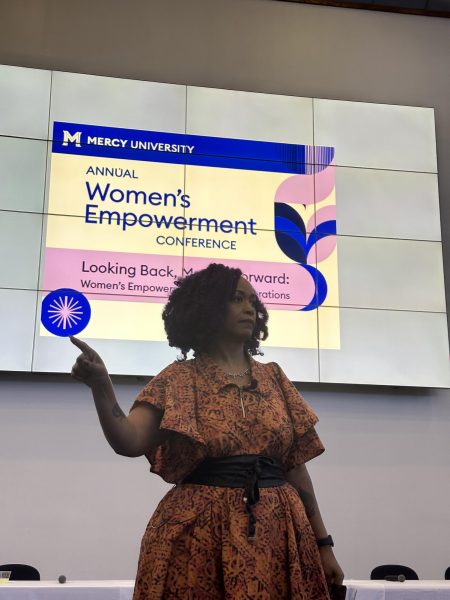What ‘Wage’ Will It Go
Congress is debating on raising the minimum wage to $10.10, will this create problems in the future?
While a bill that will determine whether the minimum wage increases to $10.10 an hour is been debated in Congress for several weeks now, young people are hopeful while Mercy’s business professors aren’t buying it.
President Obama stated in his State of the Union Address that he is planning on increasing the overall federal wage over the three years. This bill would allegedly pull citizens out of poverty. However, will it be beneficial to all workers and employers?
Executive Director of Center of Ethics and Leadership Communication, Prof. Charles J. Garcia, says, “It’s not about today’s cost of living, but about education. I do not want this bill to pass. I think Congress should educate people, and that people should get an education and create skills while working at a minimum wage job.”
Right now, there are 3.7 million workers who earn low-wages in the U.S., which is still $7.25 an hour in most states. These workers are between the ages of 18-24-years-old. Twenty states in the U.S. pay above the minimum page. Garcia says, “Everyone who is starting out in an entry job gets paid minimum wage. However, two-thirds of Americans who start out at low-wage jobs gets a raise over the course of two to three years.
“These people should learn a skill,” said Chris O’Hara, a Junior at Mercy College studying Vet Tech. “At Mercy, we are here for degrees, not skills. Not everyone can go to school. I think [passing the bill] would make the profit go up, and create more money for people who need to pay their bills.”
Media Studies Students, Lauren Ostuni and Faith MaFadden, said that taxes are going up, but MaFadden approves of the bill, while Ostuni didn’t think it would be a good idea.
Travis Wallace, a senior at Mercy said, “Maybe high school students should take a class or elective about money management, to gain skills.”
Garcia teaches finance and economic to his students. He states that Republicans an Democrats view increasing the minimum wage very differently. Republicans, believe if you increase the minimum wage to a segment to the population, you are trading off the employers. This could lead to employers laying off 500,000 workers due to the $3 hike in pay. Democrats, on the other hand, are looking for poverty reduction and income equality. If this bill passes it “may” solve the problem. Democrats think that this is one solution out of many that might work.
This could also be a problem for some higher-wage workers who will owe their jobs and increased earnings to the growing demand for goods and services.
In the Congressional Budget Office (CBO) project, it states that if minimum wage is increased to $10.10 an hour it will happen over the course of three years. In 2016, the minimum wage would be adjusted annually for inflation as measured by the consumer price index. If this bill passes, 16.5 million workers will receive a larger amount of payment, during an average week in the middle of the year, 2016. This will result in a raise of $31 billion earnings for U.S. low-wage workers. However, not everyone will see this rise. Nearly 19 percent of these workers below the poverty threshold will be affected by the rising earnings. To the almost 30 percent of workers who make three times the poverty threshold, they will receive an increase in earnings.
When everything is said and done, this bill will raise real income to $2 billion. The net pay for families who are below the poverty level would earn $5 billion under current law. This would boost their average family income by 3 percent, and it would move 900,000 people above the poverty line.
For the families and workers who earn one to three times more than the poverty level would see a $12 billion in additional real income. For the workers and families who earn three to six times more than the poverty level, they will receive $2 billion on net. There will be a decease for families and workers who earn six or more times the poverty level. They will receive $17 billion. Their average family income would be 0.4 percent.
Dominic Lipford, a Mercy College student studying film said, “I would want the minimum wage to increase. I worked at Mercy and they paid minimum wage. I need the money for tuition and paying bills.” Lipford understands that people could lose their jobs due to this bill, but he would want to see wages go up.
The annual minimum wage earning for a low-wage job is around $15,000.

Molly Stazzone is a transfer student at Mercy College. Molly is a senior studying Journalism and Communications. She has interned at Westchester Magazine...











